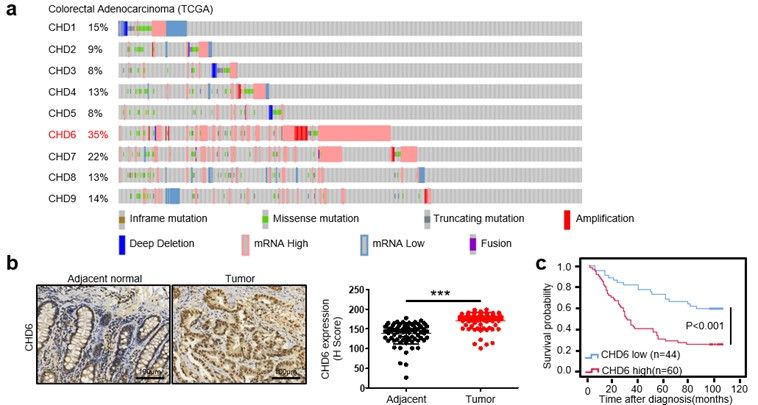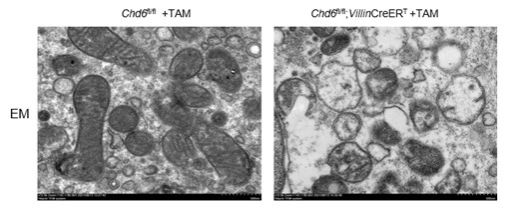Colorectal cancer (CRC) is a genetic disease with accumulated genetic alterations during the progression and invasion. CRC is highly aggressive and is the third leading malignance in the world population, and its incidence has been a health care challenge. Thus, there is an urgent need to identify more molecular biomarkers for CRC. Also, it is critical to explore the molecular mechanisms involved in CRC progression, which may help to provide new therapeutic targets.
Professor Mong-Hong Lee's team reports that CHD6 is highly expressed in CRC and high CHD6 expression is correlated with poor overall survival in CRC patients. CHD6’s chromatin remodeler activity engages in binding Wnt signaling transcription factor TCF4 to facilitate the transcriptional expression of TMEM65, a mitochondria inner membrane protein involved in ATP production and mitochondria dynamics. In addition, CHD6 can be transcriptionally activated by Wnt ligand to facilitate TMEM65 transcription. CHD6-TMEM65 axis promotes CRC progression.
They also show that aberrant EGF signals promoted the stability of CHD6 by diminishing FBXW7-mediated degradation. Cetuximab is frequently used to treat CRC patients with WT Ras /Raf. However, among these patients, only half respond well, suggesting that other gene status needs to be considered. This research demonstrates the effectiveness of Cetuximab in suppressing tumor growth in CHD6-high CRC and also point out that in addition to WT Ras/Raf status, expression level of CHD6 is critical in determining the treatment efficacy of Cetuximab. Cetuximab plus Wnt inhibitor LGK-974 as a combination treatment strategy for CHD6 high, Ras/Raf WT CRC PDX studies demonstrated the feasibility. These findings bear important prognostic and therapeutic implications for the treatment of CRC.

Figure 1 CHD6 is overexpressed in CRC and high CHD6 expression is correlated with poor overall survival in CRC patients

Figure 2 Transmission electron microscope of colon tissues obtained from unchallenged indicated mice
This paper has been published in Cell Discovery with the title of “The chromatin remodeler CHD6 promotes colorectal cancer development by regulating TMEM65-mediated mitochondrial dynamics via EGF and Wnt signaling”. Professor Mong-Hong Lee is listed as corresponding author; Assistant Professor Qingxin Liu is listed as co-first author as well as co-corresponding author; Dr. Boyu Zhang is listed as first author, and Weijie Wen, a Doctoral candidate, is listed as co-first author of this paper. This research was supported by National Key R&D Program of China, the National Natural Science Foundation of China, the Natural Science Foundation of Guangdong Province, the Basic and Applied Basic Research Program of Guangzhou City, the Guangzhou Science and Technology Program Project.
Link to the article: https://www.nature.com/articles/s41421-022-00478-z



